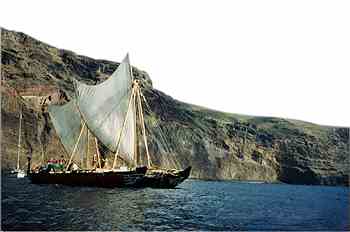In Denmark maritime traditions are uncovered well, not least by the large number of books on Danish maritime history. Apart from this, we have maritime museums, marine archaeologi-cal excavations and so on. All co-operate in keeping proud nautic traditions alive to remain an important part of our historical and cultural self-awareness.
The written word has been unknown to the Polynesians until quite recently, and historical and navigational ex-perien-ce has been handed down mainly by means of songs. As a result of missionary work and overall oppressive colonial politics, the broad social maritime understanding has had hard conditions to live under, and only very little is left. To make up for this, during the last two decades a movement has risen covering the whole of Polynesia, which goes back to the roots. Among other things, the result has been the establish-ment of a co-orpera-tion of double canoes (Polynesian Islands Voyaging Society) covering the entire Polynesian territory.
In French Polynesia there has long been a wish for starting a school of traditional navigation, but they have had no double canoe, which has been able to endure sailing on the open waters and not just in the lagoons.


